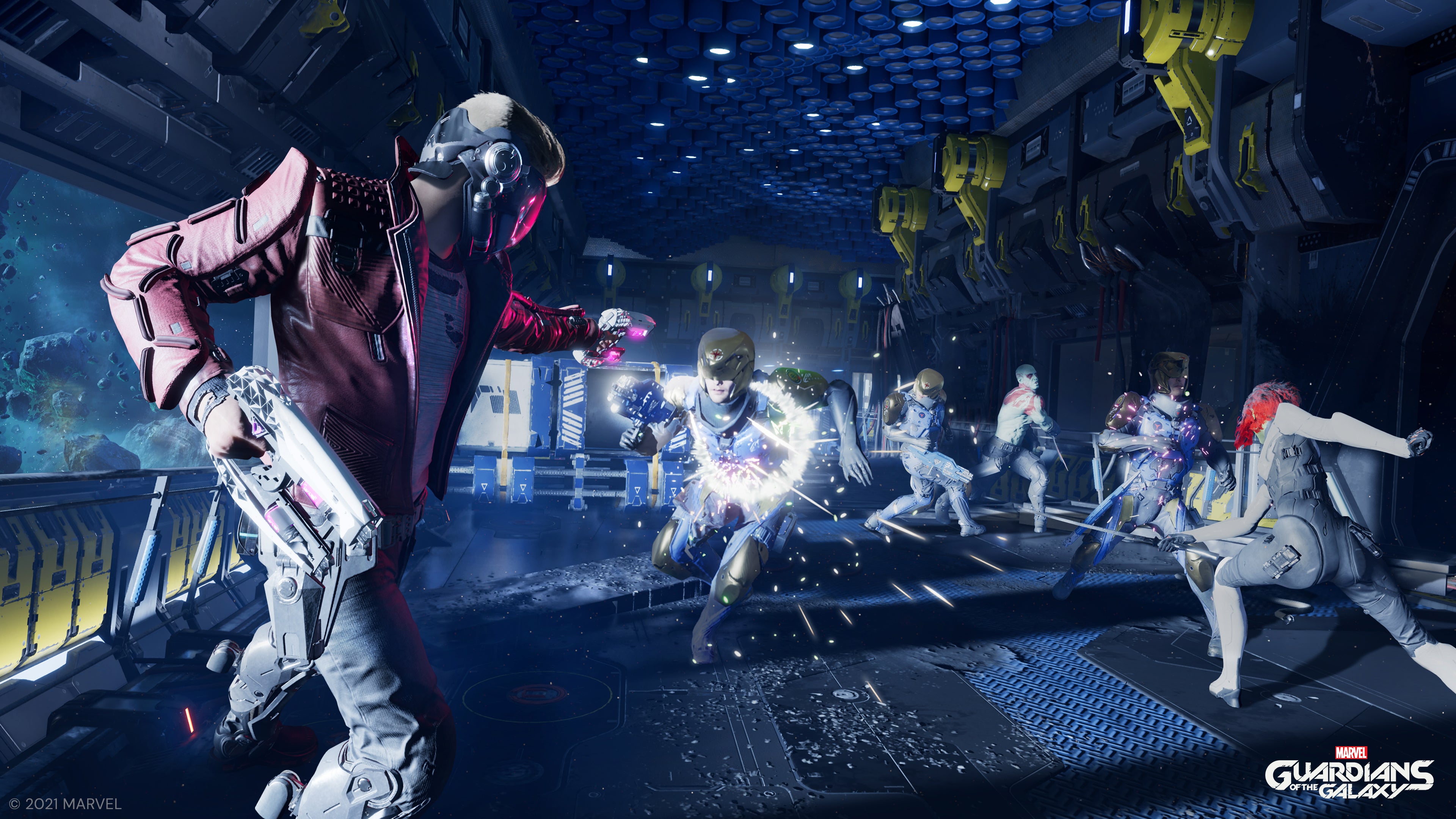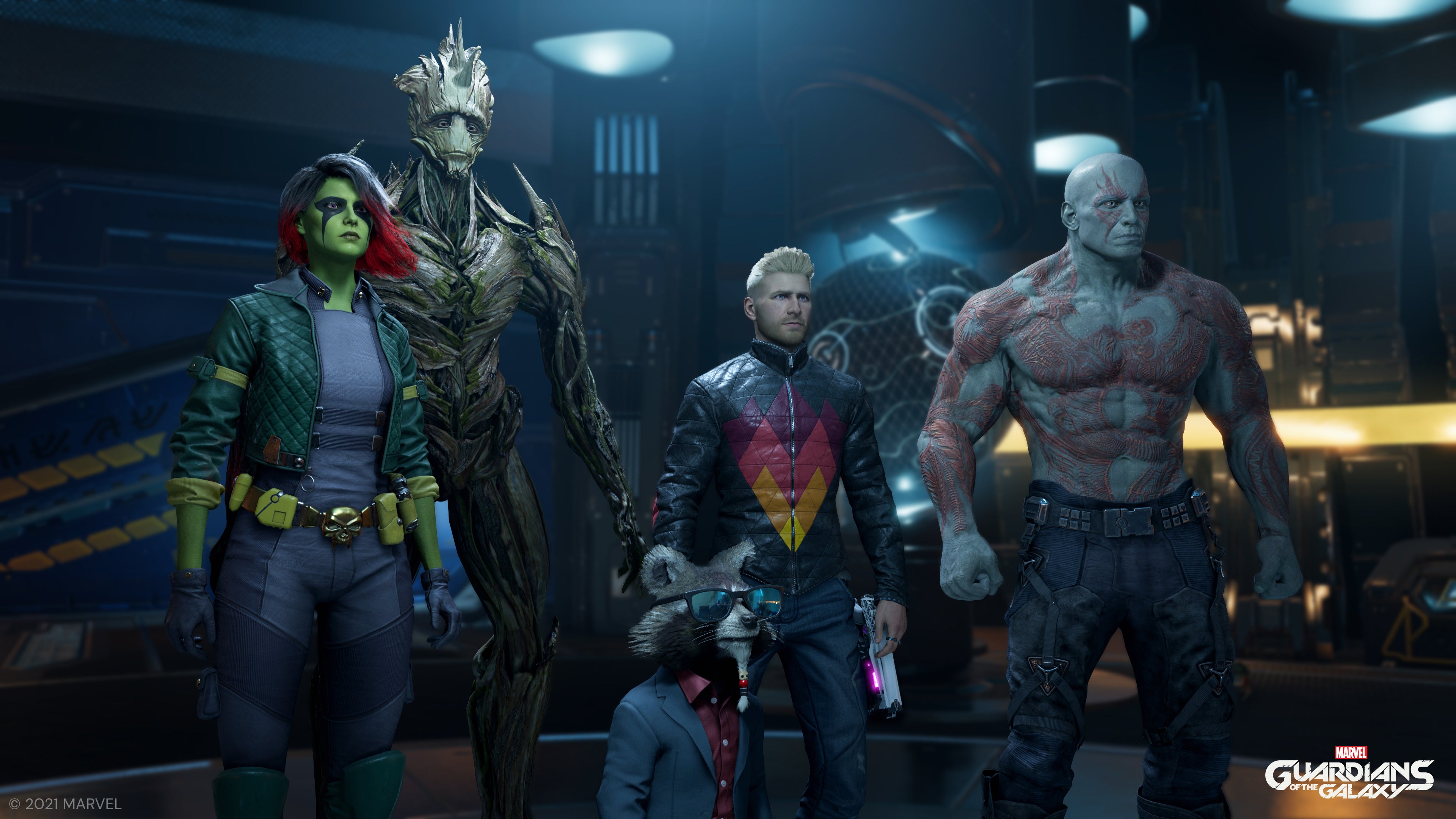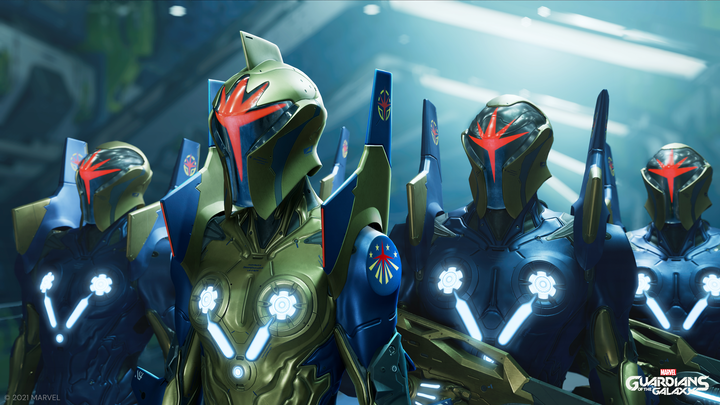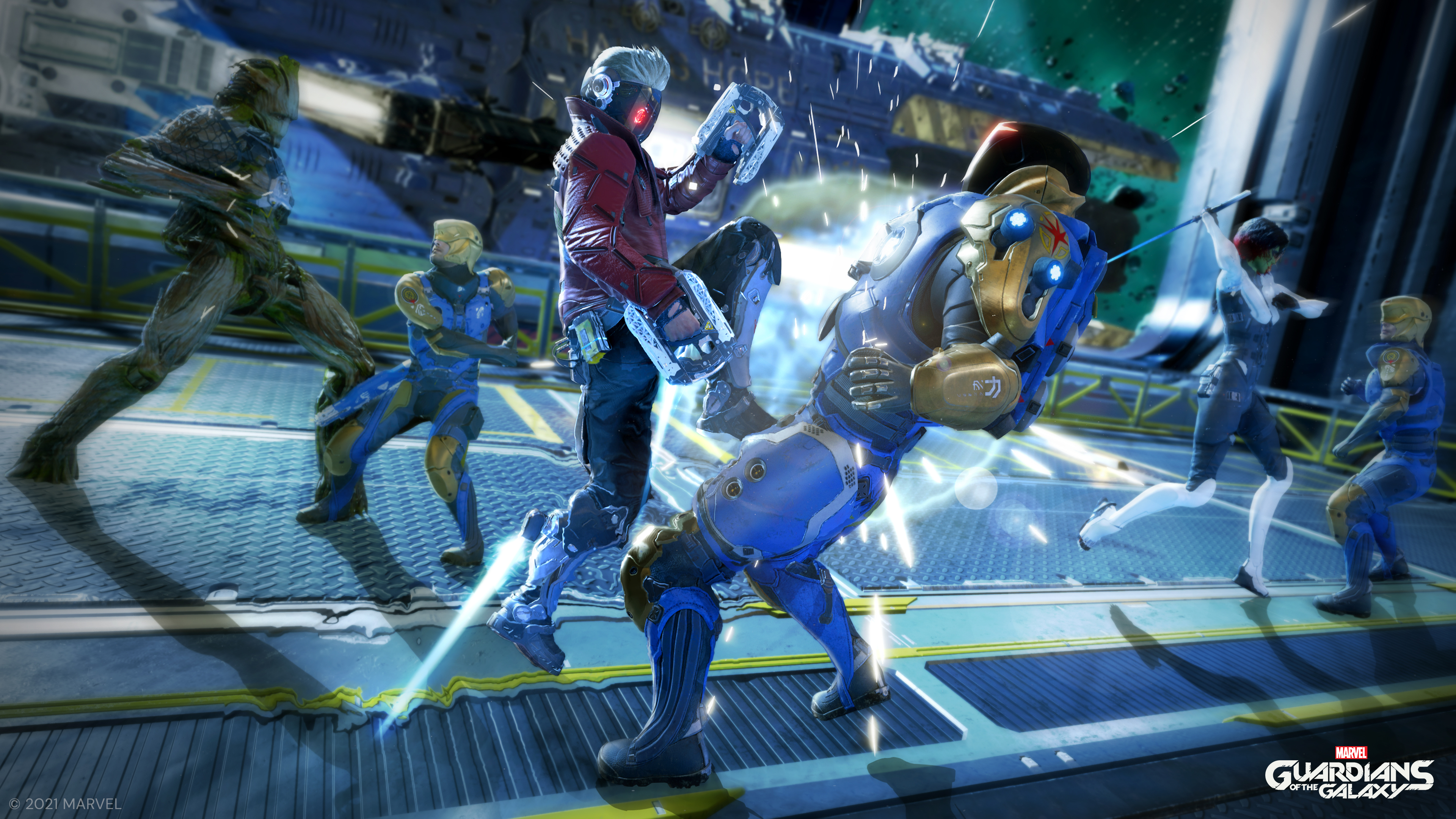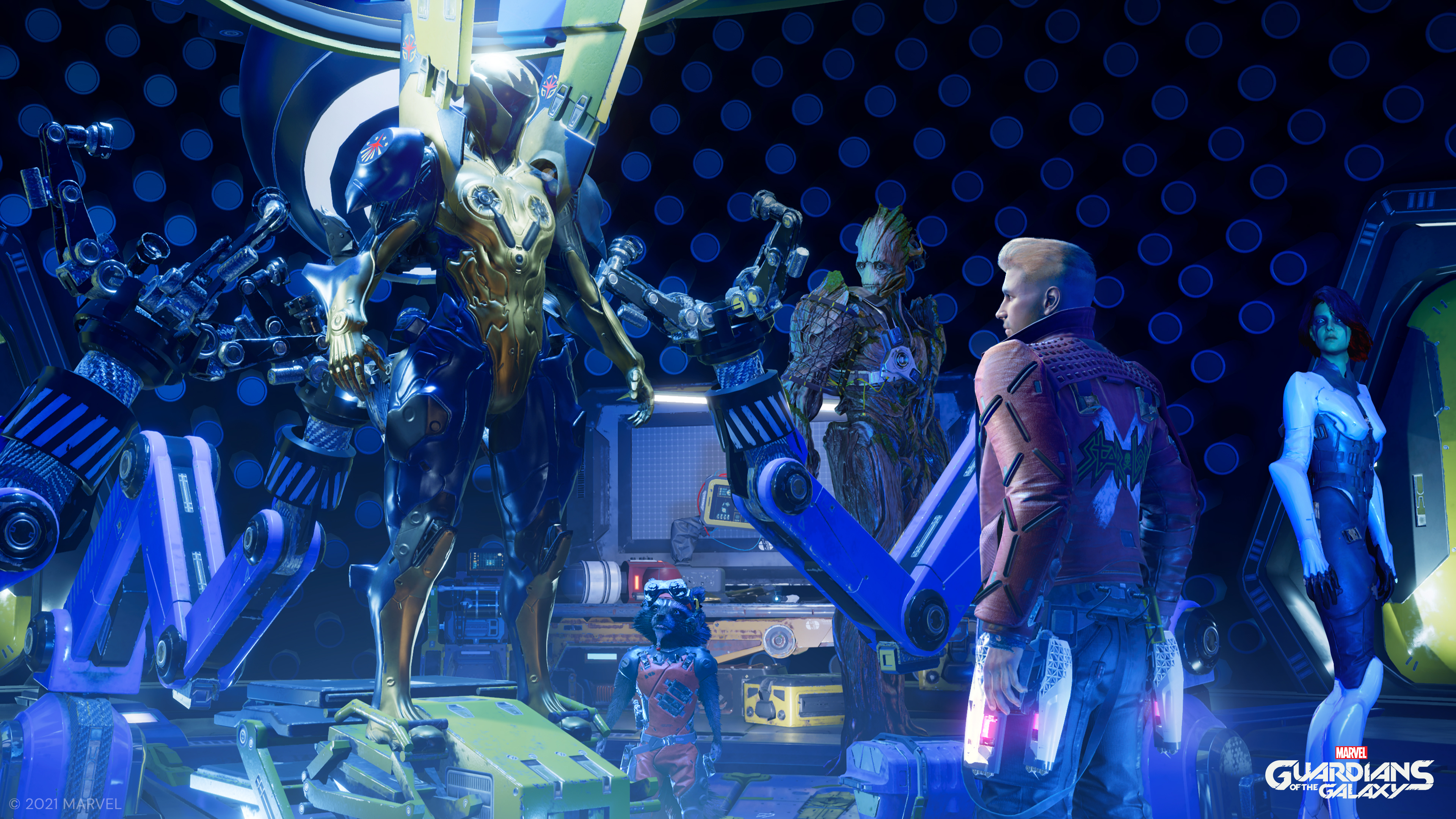Sometimes, a film sort of occupies the middle space. Black Panther is like that to me; on one hand Ryan Coogler truly created something special. On the other hand, there’s uninspired action scenes that sort of just exist, without much justification, and lack any of the flair or inspiration of the rest of the film. Why bring this up here, at the top of a hands-on with the new Guardians of the Galaxy game? Well, because I think it’s a little like that. It’s good fun, and is clearly better than the deeply flawed Avengers game. But in some ways, it struggles to really inspire. Guardians developer Eidos Montreal is exceptionally good at worldbuilding. In 2011’s Deus Ex Human Revolution, the studio re-envisioned a classic gaming universe with brilliant clarity and vision. The sequel wasn’t quite as good - but I honestly don’t hold the studio too responsible for that; it was clearly rushed out of the door. Ultimately, I hold them in high regard - and the good news about Guardians of the Galaxy is that all of that worldbuilding prowess is on display. The demo I played, which is a few chapters deep into the story, kicks off with the Guardians crew aboard their ship, the Milano. While the developers have made clear that this isn’t an RPG, pushing off early comparisons to BioWare games, the Mass Effect vibes are strong. Your crew is dotted around the ship to interrogate through numerous dialogue options. There’s items to interact with, most of which trigger new conversations or talking-out-loud musings from Peter Quill, aka Star-Lord. There’s a workbench where, of course, you can spend resources gathered in the game’s levels to upgrade your abilities. All of this sounds like the Normandy or the Tempest, right? And it sort of is. There’s Guardians touches, of course - like a jukebox packed with eighties hits including everything from Hot Chocolate to Pat Benatar, and you can set it to play as you explore the ship. Drax even comments on your choice of music. It’s neat. The conversations, meanwhile, lay the groundwork for a story that gives us a very different Guardians crew in a very different place to those in the films or comics. Some of this is delivered in dialogue; I hear snippets of where this version places Gamora’s relationship with Thanos, or how Quill came to meet Yondu. Some of the more subtle choices drive home the differences best, though. For instance, Quill is the de facto leader in the movies, but he has constant pushback from the others. In the cockpit of their ship, the seats are spread out evenly, as if to suggest an equal team. In the game, Quill sits at the back of the cockpit like a Star Trek captain, the other four sitting in his field of vision. It’s a subtle thing - but it’s telling about who this team is, and what the player’s role in it is. Off the Milano, similar lovely touches pepper the experience. Throughout my mission scouring a Nova Corps base, I’m given a number of dialogue options as Star-Lord. These not only impact what the Guardians are thinking and feeling, but also the flow of the mission. A cavalier attitude might alert the bad guys to our presence sooner, for instance, which in turn might annoy my comrades. While Eidos Montreal has got out in front of fan expectation about a wildly different branching story by stressing the game is like an hourglass in structure - fat with choice, options, and alternate storylines in the middle but ultimately funneling to the same grand finale - one can see plenty of cause for replaying missions or indeed the whole game to see alternate stories. It’s less heavy-handed than choice in a lot of games, with the choices feeling natural in the flow of things. Due to the format of this preview, I could see the screens of other players participating in this remote hands-on, and it was plain to see how different the path some of them were taking was to mine. That’s the side of Guardians where Eidos Montreal has clearly left its mark. There’s delightful little slithers of Deus Ex DNA spliced through the game - in great environmental storytelling and a particularly strong sense of artistic direction, but also admittedly in things like rough-looking choice-based dialogue scenes where everything plays out in a shot-reverse-shot fashion with rudimentary animation. There’s a lineage from Adam Jensen’s adventures - and for better or worse, I’m pleased to see it. Then there’s the other side. Like how Black Panther was a film with vision that gave way to boilerplate action scenes knocked up in previs without the director, Guardians of the Galaxy world builds and then tosses you into combat that is… just sort of fine? It’s not underwhelming, but nor is it particularly thrilling or overwhelming. I’m just whelmed. Which isn’t a word, at least not in this context - but I’m making it one. It’s early days, obviously, and I only had access to limited skills. The basic setup is simple, though - you play as Peter Quill, having access to Star-Lord’s blasters (which can fire standard damage or elemental shots), plus his fists and rocket boots. There’s flashes of brilliance in this third-person action, to be fair, with my favorite being the utility of the jet boots for dodging. That gives off a visceral sort of buzz, as good now as it was in Vanquish. In other places, I’m left a little colder. There’s a stagger bar mechanic similar to Final Fantasies 13 and 7 Remake where what you want to do is put enemies into a ‘staggered’ state, with that status being when you can lay down real damage. This can be satisfying, or it can feel flat, and which it is seems situational. Using the ice elemental shots from Star-Lord’s blasters to freeze an enemy, stagger them, and then deliver devastating blows works. But too often, I felt like I was pumping attacks into enemies with barely-depleting health bars, and not even the fun rocket-propelled movement can take the edge off that. While you’re controlling Star-Lord, the other Guardians do their own thing as AI companions. Cleverly, each has a custom AI that suits their personality. Gamora will use her ninja-like abilities to single out vulnerable enemies and take them down, for instance, while Drax dashes in to take on large groups. You can trigger special moves from each of them with a press of a button, and as you progress through the game their skills will grow just as Star-Lord’s do. These skills are vital. Groot, for instance, has a great move where he can lock a strong enemy down with his roots for a brief time, which in this hands-on proved an indispensable bit of crowd control. Also out there in the world are environmental triggers - so you can get Gamora to super-jump onto a high-hanging crate and cut the wires to drop it on enemies, or have Drax pick up and toss an explosive barrel like it’s nothing. There’s also team-up attacks, and Arkham-style finishing moves. With Quill, position is key - his blasters will do less damage further away, so there’s an optimum range to attack with him, and combat becomes an engaging back-and-forth dance - staying close enough to foes to lay down the hurt, but distant enough to avoid them returning the favor. There’s a hell of a lot to grapple with. Some elements of it worked better for me than others - but the end result is a feeling of enjoying but also feeling decidedly lukewarm on the combat mechanics as presented in this slice of the game. In this preview the combat was often so chaotic and your moment-to-moment control of the relatively squishy Peter Quill so important that it can be hard to keep track of what your allies are doing or get a Guardian to attack the right enemy at the right time while keeping track of everything else going on. Your first alert a fellow Guardian is in trouble might be a death rattle audio que, or the on-screen alert that they’re downed and need to be revived. If multiple Guardians go down you can get swamped quick, so you need to stay on top of that. To be fair, and clear, a preview like this throws you into the game several chapters deep, after tutorials will have explained and gently ramped up the complexity. I expect all of this will come off better in the final game. Regardless, though, it’s a chaotic, intense combat system - and I fear that sometimes it’s trying to do a few too many things at once. Moreover, I’m not sure if the level of chaos presented is intentional, or just the result of system design that tries to pack a hefty amount of mechanics and actions in, then ends up feeling a little over-stuffed. Probably my favourite piece of combat is the ‘huddle’ system, which draws a little bit of American Football style playmaking into matters. Like I said with the captain’s chair, Star-Lord is undeniably the leader of this crew, the glue that holds them together - and so in combat he can call the Guardians together for a ‘huddle’. The action stops, and in a scene the player looks at the rest of the group from Quill’s perspective. A couple of the Guardians make comments on where they’re at - and it’s up to you to pick how to respond to what they’re saying. So, for instance, they might be complaining about each other - Rocket saying Drax is getting in his way, Drax saying he works better alone, something like that. Regardless of what you pick everyone gets a heal and Star-Lord gets a buff - but pick correctly, and everybody gets a buff to improve their status for the rest of the battle. Immediately after a huddle is when Star-Lord pulls on his headphones and blasts fantastic licensed eighties bangers for the duration of the buff, too. Do you notice a pattern, though? Everything that’s grabbing me about this game is narrative-based. Forget the fact that these aren’t the film Guardians. They are distinct, and I’m already enjoying spending time with them, intrigued by their unique past history and what might be in their future. But when I started actually playing the game… I was left a lot less enthused. Like I say, I suppose this matches up to much of the cinematic universe, too. There’s the rough with the smooth. I found Black Widow worth sitting through for its fun character moments even though I began to tune out as soon as the action started. I’m hoping that, with Guardians, the bits I love outweigh the bits I don’t in the same way. Eidos Monreal’s Guardians of the Galaxy is clearly good. It’s going to be fun, enjoyable, and I’m looking forward to playing it. I have zero doubt that I’m going to find this game superior to Avengers. But the question is… can it ascend? Can it be great? We’ll find out in October.
